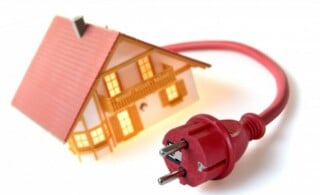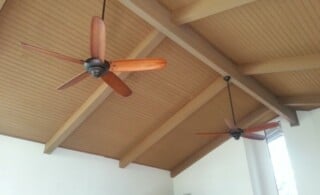
A portable generator is just what the name implies: it is meant for portable and non-permanent applications. While an excellent choice for job sites and camping trips, a portable generator simply isn’t designed to do the work that a stationary generator can do. In a pinch, a portable generator may be able to provide your home with an adequate amount of electricity to power a few necessities, but when you want the comforts you’re accustomed to, no matter what Mother Nature throws your way, a stationary generator is the way to go.
About Stationary Generators
A stationary generator is equipped with a forced air or other type of cooling system that allows it to be enclosed— most typically in an outside weather housing mounted on a concrete pad similar to a central air conditioning unit. When professionally installed (as it should be), it will kick on automatically when the normal power goes off. Typically far more powerful than any portable unit, a stationary generator will allow you to weather any outage for an extended period of time without the worry of food going bad or even missing your favorite shows (depending, of course, on how your TV gets its signal).
Generator Safety
Stationary generators have more extensive built-in protection and safety shutdown features than portables do. Since they are installed permanently, there is little risk of them being placed in an area that could present a hazard. Portable generators, though extremely useful in some situations, have run into trouble over the years because of poor placement. Generators burn fossil fuels, and therefore create carbon monoxide in the process. Carbon monoxide concentrated in a closed area can be lethal; proper ventilation is always an important consideration when using a portable generator.
Though not deadly, another facet of generator safety is keeping tabs on how much energy you are using compared to how much your generator is capable of producing. Don’t try to cut corners by not getting a generator with enough power. The cost per watt (the unit of electrical power) goes down considerably as the size of the generator goes up. Many people create problems of all sorts by buying too small. Only resistive loads like lights and heaters can be added directly to calculate load requirements. Some devices require extra power, of several magnitudes, to start up than they use to run.
Generator safety is not limited to times when your generator is running. Always remember to store any combustible fuel in a safe area.
Energy Consumption
Though you can run a generator at full capacity, you probably don’t want to do so for more than about a half hour at a time. It’s a good idea to talk with a professional and discuss the kinds of devices you’ll be running on your generator, as well as the amount of things you’ll be plugging in. Electronic loads (particularly newer computers) take relatively little power, but that power must be clean and stable (well-regulated voltage and frequency with low harmonics). But computer electronics have properties that produce difficulties for the power source. If you are planning backup power for computer networks, a “rule of thumb” — the total electronic load should not exceed 50 percent of the generator’s capacity.
Anything that makes heat with electricity (electric heat, water heaters, dryers, etc.) uses relatively huge amounts of power compared to other loads. If your house heats with electricity, consider another heat source or be prepared to buy a large generator.
 Staying Safe During a Home Power Outage
Staying Safe During a Home Power Outage  Electrical Wiring Project Checklist
Electrical Wiring Project Checklist  Upgrading Electrical Circuits
Upgrading Electrical Circuits  Adding a Home Wet Bar
Adding a Home Wet Bar  Ceiling Fan Installation
Ceiling Fan Installation 

Are You Familiar With This Topic? Share Your Experience.